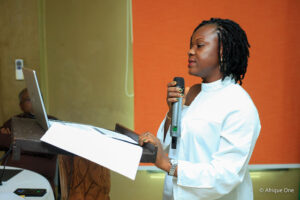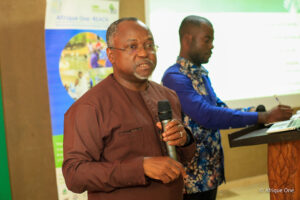12 December 2023
What contribution does the wildlife sector make to human health wellbeing? This key question was addressed and discussed with researchers from the Centre Suisse de Recherches Scientifiques en Côte d’Ivoire (CSRS), the International Livestock Research Institute (ILRI) in Kenya, in partnership with Afrique One, and wildlife stakeholders in Côte d’Ivoire. Discussions focused on the preliminary findings of the project “Wildlife and Nutrition for Health” (WN4H/CGIAR) The project is part of the 1 CGIAR initiative « Protecting Human through a One Health approach 2022-2024,” whose objective, according to Dr Hung Nguyen-Viet of ILRI, is “to protect human health by improving the detection, prevention, and control of zoonotic diseases, food-related diseases, and antimicrobial resistance.”

” The fact that a significant percentage of human diseases have an animal origin (60-70%) and with the potential of new pandemics, special attention was paid to wild animals and their interactions with humans in the framework of WN4H. The project aims within a year (2022-2023), to understand the challenges of wildlife conservation and the social and nutritional determinants of bush meat consumption in the Ivorian context,” said Dr Arlette Dindé, Afrique One postdoc fellow at CSRS.
The WN4N findings revealed an increased studies and growing scientific interest on wildlife issues in Côte d’Ivoire since the end of the socio-political unrest in 2011 and the Covid-19 pandemics. A significant number of institutions and programs are working on wildlife but mainly on conservation issues and at a less extend, the health and wellbeing and the perceptions of the population regarding the consumption of bushmeat. Most studies on wildlife in Côte d’Ivoire are localized to the main national parcs and reserves and mostly fall within the conservation domain. Research highlighted that the institutions working on wildlife operate in silos without collaboration, exchange of data and information and sometime in competition. In such context, the population consumption of bushmeat is still high with potential risks despite the Ebola crisis and Covid-19 pandemics.
These results were presented during a workshop on Friday, December 1, 2023, in Abidjan, Côte d’Ivoire to all key institutions engaged in wildlife, veterinary health and public health. Participants were from public, international, and non-governmental institutions working on wildlife and the environment in general. Together, they (i) discussed on strategies to further strengthen the contribution of the wildlife sector to health security, (ii) identified new research questions around the socio-economic development of preserved areas and the conditions for transforming the population behaviour, and (iii) proposed integrated strategies and actions allowing the environmental sector (wild life) to fully contribute to overall health system. The group work around emerging topics fostered new collaboration between institutions and paved the approach to better involve communities.

According to Professor Bassirou Bonfoh, Director of Afrique One at CSRS, “If institutions collaborate and pool their resources such as knowledge, human capacity, logistics and finances, a country can fully move towards an integrated zoonoses surveillance system. The current results will be consolidated to inform the National One Health platform for its strategy”
“The National One Health Platform of Côte d’Ivoire being the key body in charge of establishing national multisectoral mechanisms for preventing and combating health threats, we are pleased to have been associated with the presentation of the results of the WN4H/CGIAR project. The data, information and knowledge shared will allow us to strengthen the surveillance mechanisms for diseases that may emerge from wildlife and mitigate their effects on human health,” said Dr Sita Savané, Permanent Secretary of the One Health Platform of Côte d’Ivoire.
Share on: